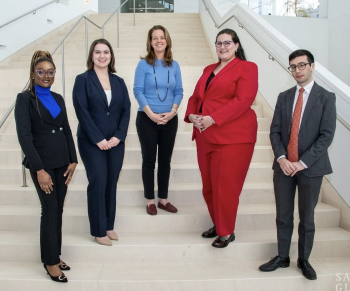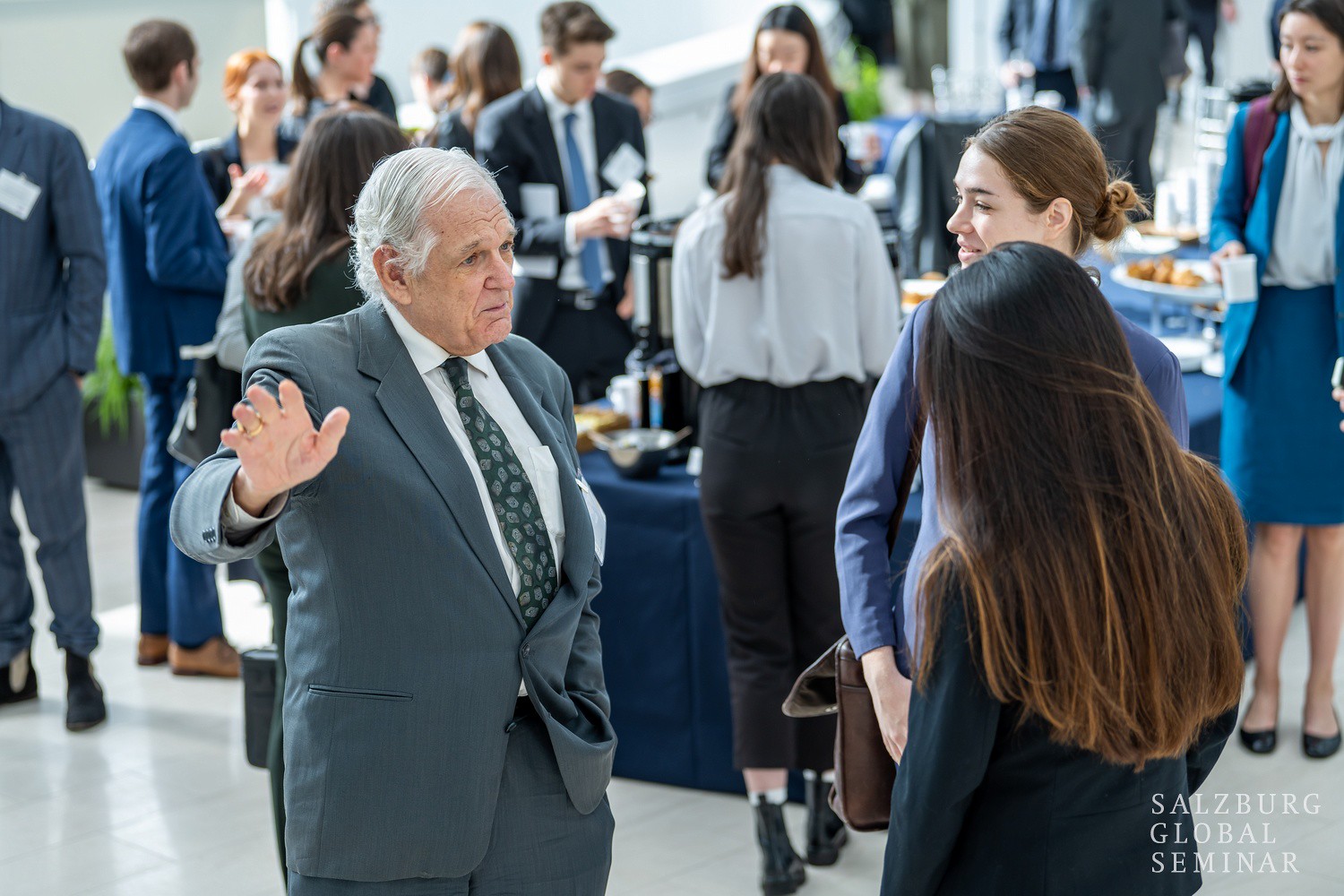Students get immersion in international law during Cutler Fellows weekend
The annual program draws the nation's top students in international law to Washington for discussions of current global issues and networking with top officials and practitioners.
 Korede Sotubo LLM ’24, Tatiana Varanko JD/LLM ’24, Professor Rachel Brewster, Amy Hartzell JD/LLM ’24, and Noah Buyon ’25
Korede Sotubo LLM ’24, Tatiana Varanko JD/LLM ’24, Professor Rachel Brewster, Amy Hartzell JD/LLM ’24, and Noah Buyon ’25
Four Duke Law students traveled to Washington, D.C., last month to explore how international law underpins global peace and prosperity as part of the 2024 Lloyd N. Cutler Fellows Program.
Noah Buyon ’25, Amy Hartzell JD/LLM ’24, Korede Sotubo LLM ’24, and Tatiana Varanko JD/LLM ’24 were among 56 law students selected to attend the immersive weekend for future leaders in international law and public service, held Feb. 8–10 at the U.S. Institute of Peace and other venues. They were accompanied by faculty representative Rachel Brewster, the Jeffrey and Bettysue Hughes Distinguished Professor of Law.
The program, hosted annually by Salzburg Global Seminar, offers students from Duke Law School and 13 other top law schools the chance to engage with like-minded peers and leaders in the international legal community through an intensive weekend of lectures, panel discussions, small group workshops on papers they submitted, mentoring sessions, and social events.
“The best part about the weekend was getting to meet the next generation of leaders in international law,” said Hartzell, a returned Peace Corps volunteer who plans to apply principles international human rights law as a public defender in the U.S.
“When we spend so much time studying the legal history and foundational principles of international law, it is rare to be able to truly look ahead and trust that our hard work will move things in the right direction. But to join a group of dedicated, brilliant people made me feel like the international legal space is in good hands. And to think that through this network I can also be part of the future of the field is incredibly rewarding.”
“Every aspect of the program proved to be exceptionally valuable,” Sotubo said. “Exploring the diverse interests of fellow participants in the field of international law and contributing to their papers was enlightening.”
Events for the Fellows included lectures and panel discussions of topics related to the theme “International Law in Times of Great Power Competition” by distinguished academics, professionals, and public servants. They included Benjamin Wittes, editor-in-chief of Lawfare, Beth Van Shaack, Ambassador-at-Large for Global Criminal Justice, and Bonnie Jenkins, Under Secretary for Arms Control and International Security, who gave the U.S. perspective on global power dynamics, and Payam Akhavan, legal counsel for the Commission of Small Island States on Climate Change and International Law, who discussed climate change litigation at the International Tribunal for the Law of the Sea.

Prior to the trip, each student prepared a working research paper on a topic in international law that they discussed and refined in small group workshops with the aim of eventual submission to academic or policy journals.
Sotubo, an attorney from Nigeria specializing in corporate and commercial law, presented a paper titled Investigating the Regulatory Implication of Central Bank Digital Currencies on Cross-Border Financial Transactions within the Framework of International Law.
“The feedback received during the workshops was well-tailored to the scope of my research and offered invaluable guidance towards refining the scope of my paper,” she said.
“I got ideas on how to better refine my research paper by taking a comparative approach to specific jurisdictions.”
Hartzell submitted a paper on the trial of Russia President Vladimir Putin at the International Criminal Court, and the ways it will require unprecedented procedural rules and trial strategies.
“I am very passionate about trial practice as a tool for human rights advocacy, and I often wish international courts saw the same performative punch that American trials can have — when they’re done right,” Hartzell said.
“In imagining the role of evidentiary procedure and public messaging in the theater of international criminal justice, my paper works as a sort of thought experiment about what kind of lasting impact Putin’s trial at the ICC might be able to have.”
On Friday evening, participants attended a reception at the Austrian Embassy hosted by Austrian Ambassador to the U.S. Petra Schneebauer followed by the Lloyd N. Cutler Lecture, “Advancing the Rule of Law: Finding the Riches Hidden in an Inch,” delivered by Hugh Verrier, veteran international lawyer and retired chair of the global law firm White & Case.
On Saturday morning, students got to spend a substantial amount of time in structured small group conversations with practitioners who listened to their personal career ambitions and helped them explore pathways in international law. The meetings are routinely cited as one of Fellows’ favorite parts of the Cutler weekend.
“The highlight for me was the “Knowledge Café” session featuring mentors who are professionals from esteemed institutions such as the International Monetary Fund, the U.S. Department of State, and others,” Sotubo said.
“Having the opportunity to connect with these professionals and cultivate ongoing mentorship relationships with them was highly valuable.”

The 2024 cohort of Cutler Fellows included students from Duke Law School and the law schools of 13 other universities: Columbia University, Cornell University, Georgetown University, Harvard University, New York University, Northwestern University, Stanford University, UC Berkeley, University of Chicago, University of Michigan, University of Pennsylvania, University of Virginia, and Yale University.
Established in 2012 by Salzburg Global Seminar, an independent non-profit organization dedicated to creating networks that foster collaboration and innovation, the Cutler Fellows Program honors the late Washington “super-lawyer” Lloyd N. Cutler, general counsel to two U.S. presidents and a proponent of developing new leaders in international law and public service. Following participation, Cutler Fellows have access to an international network of more than 500 program alumni, as well a broader network of more than 40,000 fellows in 180 countries who have attended Salzburg Global Seminar’s programs.
“I’d like to think that someday, when the people I met in DC are the world’s legal and political leaders, the need for a curious trial lawyer with a rebellious spirit and an encyclopedic knowledge of ICC procedure will arise – and I’ll be their first call,” Hartzell said.
“I truly felt like the Cutler Fellowship is helping me to slowly carve out my place in the world, and for that I am endlessly grateful to Duke Law for giving me this opportunity.”